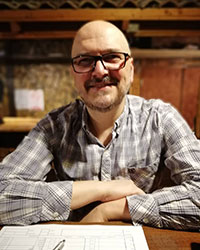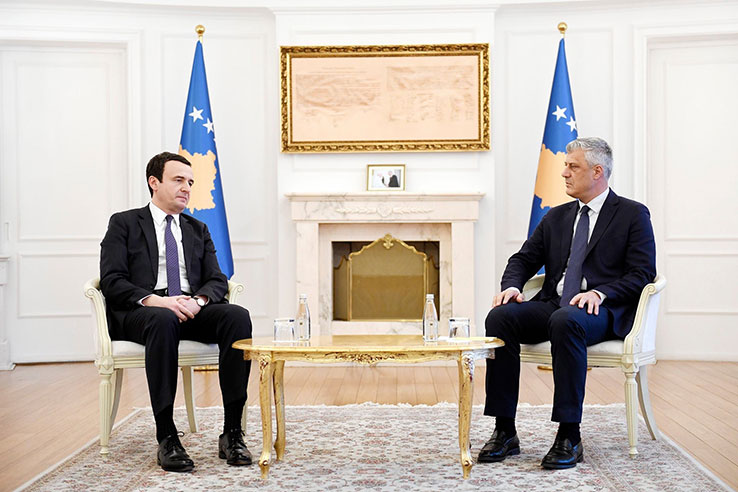Isak Vorgucic
 Less than a month after the easing of restrictive measures, Kosovo is facing a sharp increase in the incidence of coronavirus cases, which is no obstacle for political opponents to deal less with the health and well-being of citizens, and more with the continuation of political skirmishes.
Less than a month after the easing of restrictive measures, Kosovo is facing a sharp increase in the incidence of coronavirus cases, which is no obstacle for political opponents to deal less with the health and well-being of citizens, and more with the continuation of political skirmishes.
The novel coronavirus, which began its deadly journey in China late last year, arrived in Kosovo in the first half of March. At a time when the virus was starting to break the immunity of Kosovars, political games were afoot behind the scenes, with the aim to tear down the newly elected Government, which did not withstand these blows for a long time, so Kosovo changed two Governments during the entire coronavirus pandemic. Fortunately, they were timed in such a way that the Government that was prone to stricter measures, was in power at the beginning of the pandemic, and the one that was more inclined to relax the measures came towards the end.
Divided health system
The government under Kurti reacted quickly in the adoption of restrictive measures, and due to the sudden increase in the number of infected persons the municipalities Malishevo, North Mitrovica and Zvechan were immediately placed under quarantine. These towns were later joined by Klina, Vitina, Urosevac and Pristina, where the number of infected people increased by 20 in one day.
The media started promoting the recommendations of the institutions with the hashtag #ostanikodkuće #rrinshpi (#stayhome) with the logo of the television station, and by showing educational content - how to prevent the transmission of the virus and how to protect yourself and others. Leading by example, the representatives of the institutions mostly pointed out the importance of respecting the recommendations of health institutions and keeping their distance during meetings. Kindergartens, schools and universities, as well as borders, cafes, restaurants, shopping malls and sports and cultural facilities were closed down immediately, and citizens were restricted in their movements.
Depending on the penultimate number in their ID cards, citizens were allowed to move in several daily slots of 90 minutes each for the purpose of purchasing groceries, limited to two people per car. Knowing the poor state of healthcare, they introduced drastic measures that were the only way to prevent a sudden increase in the number of cases and the congestion of unprepared hospitals. After all, in this respect, Kosovo does not differ too much from its neighbors, who are also not known for their excellent health systems.
Specific to Kosovo is that, in the majority of Albanian areas after 1999, health institutions function under the patronage of the new authorities in Pristina, while Serbian doctors continued to work in smaller places inhabited by Serbs, under the Ministry of Health in Belgrade. Without a doubt, both health institutions have been suffering from a chronic lack of medical equipment for years, in this case the equipment for more severe cases of COVID-19. Kosovo's Minister of Health, Arben Vitia, soon introduced a state of emergency, which meant closing down private hospitals and clinics for the full engagement of doctors in state hospitals, and admitting only urgent patients and focusing on those with coronavirus symptoms. This approach was implemented by both systems, but the statistics of counting new cases of infection were calculated separately all the time, so when the Kosovo Ministry of Health publishes daily statistics of COVID-19, those numbers do not include those from Serbian areas. On the other hand, the Public Health Institute in North Mitrovica issues special statistics counting exclusively its insured persons.
Minister Vitia soon informed the public that Kosovo has 142 respirators available, both in the public and private sectors, with the announcement of the arrival of a couple of dozen new ones, as a donation from international organizations. At the same time, the number of available respirators for hospitals under the Serbian system remained a mystery. Authorities at the Clinical Center in North Mitrovica announced that there are enough respirators, while in addition to the existing one in KC Gracanica, the local self-government provided one additional respirator. Learning that they now have two respirators at their disposal, about 60,000 inhabitants from smaller Serb areas south of the Ibar River, which gravitate towards KC Gracanica, were able to breathe freely. Joking aside, there is a silver lining in the fact that these people live mostly in rural areas, where there are not many contacts, and the work itself at this time of year is reduced to agricultural work, i.e. outdoors.
Rivalry of the Prime Minister and the President
In the early parliamentary elections in October 2019, Albin Kurti's party led, primarily because of the oath to fight deep-rooted corruption, but also the policy of reciprocity in relations with Serbia. However, insufficient percentages of election winners have led to Self-Determination negotiations on forming a new Kosovo government taking twice as long as Prime Minister Kurti managed to stay in office as leader of that coalition. After only 50 days, in the middle of a state of emergency due to the pandemic, his coalition partners from the Democratic Alliance of Kosovo, and all 10 deputies of the Serbian List, turned their backs on him.
Pursuant to the decision made at the telephone conference, the Government of Kosovo banned the movement of citizens and private vehicles from March 24 in the period from 10 am to 4 pm during the day, and during the night from 8 pm to 6 am the next day. It could be seen that the citizens almost without exception adhered to the restrictions and recommendations. Most of them wore protective masks and gloves during the period of allowed movement, and crowds, contacts and the presence of children and the elderly on the streets were drastically reduced.
In the times that no movement was allowed, the images of deserted streets of towns and villages were eerie, with rare teams of journalists who recorded this situation with photographs and footage. The statistics of people infected with COVID-19 at the end of June show over 2,000 recorded cases, almost 1,100 recovered, but unfortunately also over 30 with a fatal outcome. The Clinical Center in North Mitrovica last informed the public in mid-June that over 100 persons were infected and a slightly smaller number were cured, while ten died. In general, compared to the countries in the region, the number of cases in Kosovo is higher than in Albania and Montenegro, but several times lower than in North Macedonia and Serbia.
 Source: europeanwesternbalkans.com
Source: europeanwesternbalkans.com
Instead of going to school, our youngest started attending “remote” classes. This is when the teacher relaxedly explains the lesson in front of the camera, and the parents in front of the small screens are pulling their hair out, trying to make the younger children attentively follow the lessons and write everything down on time. The preparations and broadcasting of these programs were organized by two ministries, because there are two school systems in Kosovo: one falls under the Government of Kosovo, and the other under the Government of Serbia. Each of these systems functions according to its own rules, has its own special curriculum, starting and ending dates of school years, holidays, working and non-working days, and even "remote learning" TV programmes. However, when the closure of schools in Kosovo was announced, Serbian schools were also closed, even though in Serbia they remained open for another week.
Given that Kosovo suffered about 300m euros in production losses in the first 50 days, the Kosovo government has urgently adopted a fiscal package of about 180m euros, to be paid in several different categories. In addition to favorable loans for companies, aid was paid to workers at risk of the virus, welfare recipients, workers of companies suffering losses due to business downturns, those who lost their jobs due to the pandemic, but also everyone who managed to sign an employment contract during this period. Financial aid has certainly helped the most vulnerable families at the moment, but it did not prevent a large number of people from losing their jobs. The consequences of this state of the local economy will certainly be seen more clearly by the end of the year.
The rivalry between Prime Minister Albin Kurti and President Hashim Thaci, as well as constant disagreements with coalition partner Isa Mustafa, are mainly the reasons for the quick fall of the Government. Two days after the introduction of the restriction of movement due to the first cases of COVID-19, the Kosovo Assembly passed a resolution revoking the mandate for negotiations with Serbia from the competence of the President, and handing it over to the Assembly. As expected, the president did not take this easily, so there was a torrent of insults against the Prime Minister on Twitter. The President also challenged the constitutionality of restricting the movement of citizens, and demanded that a state of emergency be imposed, which is within his competence, but despite Isa Mustafa's support, he could not secure a two-thirds parliamentary majority to impose a state of emergency. Using Twitter again, this time he called on the citizens and the police to disobey the Government's measures as unconstitutional (!?). Joining him in this call was Minister of the Interior, Agim Veliu, from the ranks of Isa Mustafa's party, who was replaced by Prime Minister Kurti despite the coalition agreement with the Democratic Alliance. In addition, during his terms, Albin Kurti replaced the party-employed directors of the largest public enterprises, electricity, telecommunications and railways, as well as his adviser and journalist Skeljzen Gashi, whom he did not forgive for the statement that "some KLA members committed crimes against innocent Serb civilians."
The removal of Minister Veliu and Kurti's refusal to unconditionally abolish taxes on 100% of goods from Serbia, which would unblock negotiations with Belgrade, were mainly the reasons why Mustafa eventually overthrew the government. However, Mustafa's deputy and the Speaker of the Assembly, Vjosa Osmani, did not give her vote for the removal of Kurti, and the party did not forgive her for that, so after a long dragging through the mud in local tabloids, she was expelled from the presidency.
Instead of dissolving the Assembly and calling new elections after the fall of the government, the President, to everyone's surprise, offered a new mandate to Isa Mustafa's party, and the Constitutional Court, despite Kurti’s appeal, ruled that Thaci was right and that forming a new government without elections was completely fine. Less than a month later, the prosecution of the Special Prosecutor for War Crimes in The Hague announced the details of the future indictment against Hashim Thaci and his war and party comrade Kadri Veseli, which announced the imminent end of their political careers.
Rapid growth of infected citizens
A month and a half passed from the first cases of the coronavirus to the peak of the epidemic in Kosovo, when a jump of 250 new infections and 10 deaths was recorded. The curve then started to fall slightly, which is one of the reasons for the decision, this time of the new Prime Minister Avdulah Hoti from the ranks of the Democratic Alliance of Kosovo, on the complete easing of measures on June 1. Restrictions on movement were lifted, cafes and restaurants were opened, but mass gatherings indoors remained banned. Due to that, the repeat local elections in two municipalities in Kosovo has not been held yet, while the Serbian republican elections were held in all municipalities with a Serb majority, with the presence of the OSCE and the security of the Kosovo police.
The mandatory two-week quarantine for those who enter Kosovo has been abolished, so the crowds typical for this time of year are once again gathering at the borders. Kosovars who work in the countries of Western Europe spend their summer vacations visiting their family in Kosovo, and typically they continue their summer vacations to the Albanian or Montenegrin coast. This "summer migration", which lasts from June to September, is measured by tens of thousands of visitors, which are crucial for the local economy, but during a pandemic can also contribute to a faster spread of the virus.
Less than a month after the easing of the restrictive measures, Kosovo is facing a sharp increase in the incidence of coronavirus cases, which is why it is possible that the measures will be tightened again. In the summer months, children on summer break and people on vacation will increase the crowds in the cities, which eases the spread of the virus, but it does not bother political opponents to deal less with the health and well-being of citizens, and more with continuing political skirmishes.
Coronavirus has joined the list of currently incurable viruses in Kosovo this year, althrough there is still hope that scientists will find a vaccine. We have acquired "herd immunity" to socio-political viruses, so for us this is a very ordinary Kosovo spring.
This blog is published as part of the regional blogging initiative “Tales from the Region”, coordinated by Res Publica (Macedonia), in partnership with the Institute for Democracy and Mediation (Albania), Analiziraj.ba (BiH), KIM Radio (Kosovo), Sbunker (Kosovo) the civic initiative „Ne Davimo Beograd“ (Serbia) and PCNEN (Montenegro).
Please read the rules about commenting and republishing.
Note: The views and opinions expressed in this article are those of the author and do not necessarily reflect the views of the Institute of Communication Studies or the donor.


